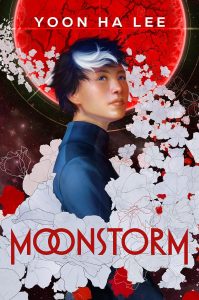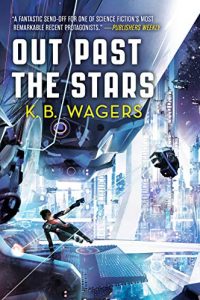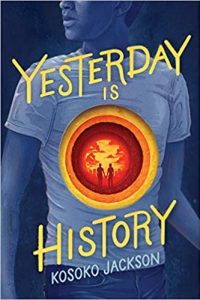Alexandra Pierce Reviews Moonstorm by Yoon Ha Lee
 Moonstorm, Yoon Ha Lee (Delacorte Press 9-780-59348-833-1, $19.99, 352pp, hc) June 2024. Cover by Priscilla Kim.
Moonstorm, Yoon Ha Lee (Delacorte Press 9-780-59348-833-1, $19.99, 352pp, hc) June 2024. Cover by Priscilla Kim.
As Yoon Ha Lee’s YA novel Moonstorm opens, Hwajin is ten years old, living with her extended family on the clanner moon Carnelian, part of the Moonstorm. Carnelian has an eccentric orbit, and its gravity is consistent only when there is harmony amongst the people living on it. On the very first page, Carnelian is attacked by the neighbouring Empire; Hwajin’s world is literally and metaphorically torn apart, as the gravity of her moon changes and she watches her family die. She, however, is rescued by one of the Imperial lancers that did the attacking. Six years later, now called Hwa Young, she’s an Imperial ward of the state, attending boarding school on a peripheral Imperial world called Serpentine, and dreaming of becoming a lancer pilot herself. When Serpentine is attacked by clanners, Hwa finds herself evacuated with her classmates (including best friend Geum and nemesis Bae) to the Eleventh Fleet, and is suddenly a lot closer to realizing her dream. Being with the Fleet means being close to the fighting against the clanners – Hwa’s own people, although no one else in the Fleet knows that – and, of course, Hwa ends up involved in it.
Lancers are enormous humanoid mechas; they choose their own pilots, and pilot and machine form a bond that allows them to act as one entity. Exactly how this works is left opaque; given this is the first in a trilogy, we can hope it will be explored in later books. Mechas have been popping up a bit recently – in Neon Yang’s Genesis of Misery and Emma Mieko Candon’s The Archive Undying, amongst others – and it’s fascinating to see the different ways that enormous war machines can be used, and discussed. Lee’s use of mecha and AI is bound to complicate things, with the mecha literally having a mind of its own while being bound to a human who has to deal with things like official orders, and their loyalty to other people.
There’s a lot going on in Moonstorm. There’s the greed of empire, and its vicious determination to wipe out those who refuse to collaborate. There’s autocracy, and how adherence to one way of living in enforced; and how both empire and autocracy work together with militarism. Along with this there’s also the very personal experience of adolescent friendship. Hwa’s best friend Geum works in engineering, rather than being a pilot; zie and Hwa need to figure out how to make a friendship work between two groups that aren’t expected to socialize. Then there’s the perfect and highborn Bae, against whom Hwa is always measuring herself and falling short: Lee walks a fine line in making Bae obnoxious, but not so awful that this reader would be happy to see her pushed out an airlock.
Readers of Yoon Ha Lee’s Machineries of Empire series will notice a familiar concept in Moonstorm – consensus creating reality. In that earlier series, it was the agreement to adhere to a particular calendar that allowed certain weapons to function. Here, it’s social harmony that literally affects the gravity. Imperial subjects pray to the Empress; the Empire’s credo is ‘‘Trust the Empress. Move at her will. Act as her hands.’’ Clanners reject the Empire, but similarly emphasise harmony to ensure cohesion (and gravity): ‘‘Do as others do. Stay where others are. Unity is survival.’’ This overwhelming emphasis on social cohesion – no dissent can be tolerated – feels like pointed commentary given the state of the world at the moment, and is literally used as a weapon in the story. Given Lee’s track record with setting up ideas and then subverting them, I hope and expect that he will do something similar here; the conclusion of the novel is already setting up something along those lines.
Don’t be fooled by my discussion of themes, though; Moonstorm is at heart a delightfully fast-paced adventure novel. The main characters are believable, their relationships have room to develop, and the mechas are intriguing and promise to be more so. This is an excellent addition to Lee’s oeuvre, and I look forward to seeing where Hwa and her companions end up.
Alexandra Pierce reads, writes, podcasts, cooks and knits; she’s Australian and a feminist. She was a host of the Hugo Award winning podcast Galactic Suburbia for a decade; her new podcast is all about indie bookshops and is called Paper Defiance. Alex has edited two award-winning non-fiction anthologies, Letters to Tiptree and Luminscent Threads: Connections to Octavia E Butler. She reviews a wide range of books at www.randomalex.net.
This review and more like it in the April 2024 issue of Locus.
 While you are here, please take a moment to support Locus with a one-time or recurring donation. We rely on reader donations to keep the magazine and site going, and would like to keep the site paywall free, but WE NEED YOUR FINANCIAL SUPPORT to continue quality coverage of the science fiction and fantasy field.
While you are here, please take a moment to support Locus with a one-time or recurring donation. We rely on reader donations to keep the magazine and site going, and would like to keep the site paywall free, but WE NEED YOUR FINANCIAL SUPPORT to continue quality coverage of the science fiction and fantasy field.
©Locus Magazine. Copyrighted material may not be republished without permission of LSFF.






